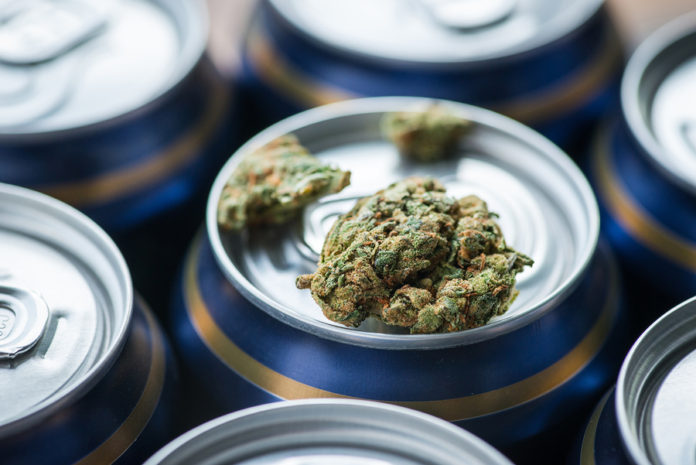
Spotting a multibillion dollar opportunity and a way to shore up declining revenue, leading beverage manufacturers, including Coca Cola, Molson-Coors, and Heineken are banking on new non-alcoholic cannabis drinks. This will position them well to meet consumer demand in the future — according to a survey by AT Kearney, more than half of U.S. and Canadian consumers would be willing to try cannabis-infused food and drinks if it were legal.
While the survey results suggest that cannabis-infused snacks are likely to be a much bigger market than drinks in the long run, beverage companies are leading the charge for now. Falling sales of beer and soda are a big incentive for them to jump into this market, a situation that may be related to the fact that in states where marijuana use is legal, people drink less alcohol.
Active substances in cannabis: CBD and THC
Cannabidiol (CBD) and tetrahydrocannabinol (THC) are the two main active cannabinoids extracted from marijuana plants today. They are consumed both medicinally and recreationally, and research into their health effects is ongoing.
The two compounds are classified differently by the DEA (Drug Enforcement Agency):
- In September, the DEA reclassified an FDA approved CBD-based medicine, Epidiolex, as a Schedule V drug, downgraded from Schedule I. Schedule V drugs (Robitussin is another example) have a low potential for abuse and are among the least restricted medicines. According to the National Law Review, this is the first time that any marijuana-based drug has been approved by a federal agency for lawful medical use.
- THC is still classified by the DEA as a Schedule I drug (along with heroin and ecstasy). However, THC’s classification has been downgraded in several states. THC-infused non-alcoholic beer and wine are already available, mainly at licensed cannabis dispensaries.
A patchwork of confusing regulations…with relief in sight
Food and drink manufacturers will need to accept a little uncertainty in the not-yet-legal U.S. market for recreational cannabis-derived consumables. State and federal agencies have conflicting regulations that apply to different parts of the cannabis plant and to different uses and products.
Cannabis drinks and edibles are already legal – under various restrictions – in nine states including Washington, Colorado, California, and Oregon. A farm bill on the ballot in the upcoming midterm elections is expected to pass and make CBD legal throughout the country, though there will still be restrictions and likely slow adoption. Several states also have midterm ballot measures on the recreational use of cannabis.
Opportunities in Canada and some states
Meanwhile, Canada legalized recreational marijuana on October 17 and is expected to legalize recreational cannabis-infused drinks and foods in 2019. To meet the anticipated demand, many beverage giants are teaming with legal pot growers in areas where it’s legal to create new products:
- In August, Constellation, manufacturer of Corona beer and Sveda vodka, made an unprecedented $4 billion investment in Canada-based marijuana grower, Canopy Growth Co.
- Heineken-owned Lagunitas Brewing Co., in partnership with AbsoluteXtracts, released a non-alcoholic THC-infused sparkling water in July. It’s currently available at licensed cannabis dispensaries in California.
- Coca Cola is reportedly in talks with marijuana grower Aurora Cannabis to make CBD-infused drinks as part of a joint venture. (Pepsi, on the other hand, currently has no plans to enter the cannabis market.)
- Molson Coors entered into a joint venture with marijuana grower Hydropothecary to develop non-alcoholic cannabis-infused beverages.
- Walmart Canada may be the first major retailer to sell CBD products.
____________________________
With Canada legalizing marijuana and the U.S. expected to do so as well, forward-looking food and beverage manufacturers are making moves to create new lines cannabis-infused products, including candy, savory snacks, coffees, bottled waters, energy drinks, specialty teas, and non-alcoholic wines and beers.
There are still a lot of questions unanswered on the regulatory front, but the potential is huge. For now, competitors in this multibillion dollar market will need to proceed with caution, a tolerance for messy and ambiguous regulations, and a willingness to experiment.








